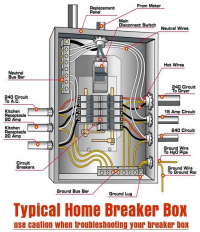The purpose of a ground wire is for safety, should a hot wire short to a metal electrical box or in an appliance, a breaker will trip. If it is a 30 watt or 3000w it is all the same, either one is just as dangerous (or not dangerous). Wattage consumed has no effect on safety, high voltages do. If you. are on the first floor and the electrical panel is on an exterior wall, you could run one. Drill through the usually concrete block wall, hammer in a ground rod, if at all possible with rock hard ground. Also the electrical panel need a terminal block for grounding. Now how do you get a ground to the receptacle for the AC unit. Is it a three prong unit or direct wired? Being an old building I suspect you have only a two prong outlet. Buildings there use a flex conduit in the concrete walls and floors and it will be nearly impossible to run any wires. If it is ridged metal conduit, then it is possible.
Where in Saudi? I was in Jedda in 1978 and the ground is bone dry. A ground rod won't help any. Some areas have a central water system, look for fire hydrants then there is a possible ground if they are metal pipes. Most homes and apartment have water towers on the roof. Also, look at the breaker panel. Remove the cover and look for a ground bar and if any that go to a ground rod. Do not confuse it for the neutral bar. Another issue is depending on the contractor and country that built the building. Europe and North American use different colors for all three (hot, neutral, and ground) wires. Codes usually were based on the country of the contractor. Either way the ground wire will be green or green/yellow for all countries.
Read about Wiring Color Codes Infographic (Color Codes) in our free Electronics Textbook

www.allaboutcircuits.com
Typical breaker panel for North America. Depending on the country the panel was manufactured in, basically it will be the same however in a small apartment, only one hot wire may be connected as you have and the panel will only have one buss instead of two.
View attachment 84284


